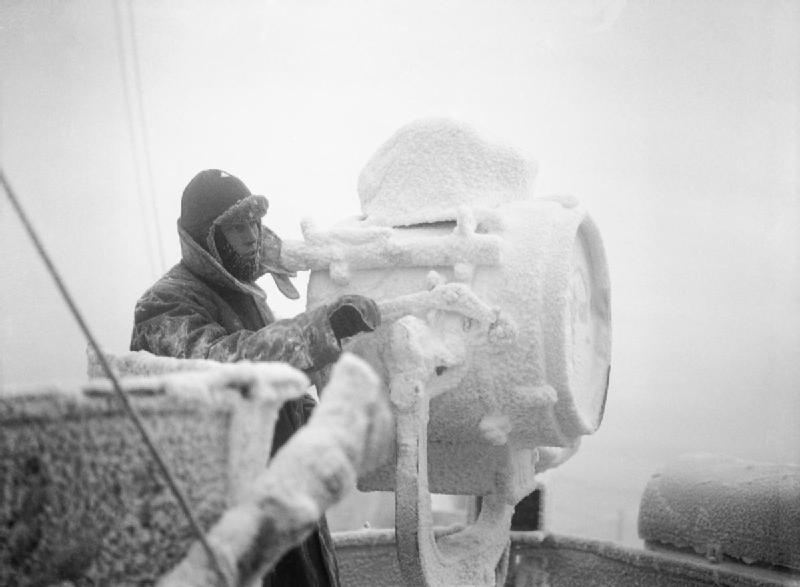
Cruiser HMS Sheffield, credit Wikipedia
Endnotes, March 2024
In this edition: George Lloyd’s Arctic symphony, plus Nicola LeFanu’s path across the dunes, reviewed by Stuart Millson
Recently issued by Lyrita is a definitive collection of symphonic music by one of our country’s many overlooked composers, the Cornishman George Lloyd ~ a figure who, after war service in the Royal Navy on HMS Trinidad, sought mental refuge and spiritual self-repair in the peace of Switzerland; and when back in England, in market gardening and mushroom farming but with the early mornings of his horticultural day devoted to composing.
The Symphonies 1-6 and the Agincourt-themed overture, John Socman (written for the 1951 Festival of Britain) are presented on Lyrita’s handsome box set, with not only detailed programme notes by Paul Conway and a fascinating assessment of Lloyd’s life and times ~ childhood in St. Ives, to inter-war years questing for recognition ~ but a photo-album, too, of the composer with fellow musicians, friends and supportive family. Lloyd’s father wrote the libretto for the opera John Socman; and the composer’s marriage very likely saved his sanity, following the trauma of war spent in the Arctic convoys.
From the box set, the hugely impressive, splendidly designed musical architecture that is the lyrical, hour long Symphony No. 4, written at the war’s end and subtitled, ‘The Arctic’, stands out. How poorly served for choice we are by our orchestras today. Lloyd’s Fourth Symphony is a masterpiece but is rarely played or broadcast in this country. It fell to New York State’s Albany Symphony Orchestra to perform the piece under the composer’s baton (in a rich, wide acoustic) ~ although to be fair to our own native musicians, the bulk of the box set displays the no less virtuosic playing of Manchester’s BBC Philharmonic.
Noble horn and brass statements give a proud stoicism to this extensive musical drama; not an obvious programmatic description of frozen wastes, perhaps, but a complicated, personal response, in terms of heightened feelings, to extraordinary surroundings and times. A first movement of Sibelius like stored up energy gives way to moments of sustained lyricism. In the carefree, slow movement there are echoes of the American composer, Roy Harris, evoking a vision of black pine forests and rivers of snow water. But nothing prepares you for the 20 minute long final movement. With perfect, sure footing in its initial sequences that make complete ‘conversational’ sense (no idle note spinning here), a quietly confident, march theme sweeps up through the orchestra ~ bringing out playing of an infectious, even hypnotic spirit. The marching theme reappears in the movement, leading to a great, optimistic conclusion ~ and causing the listener to ask: could this really be the work of a man so recently scarred by war? Evidently George Lloyd possessed great inner strength.
From the metier label comes music of more astringent proportions: short, Webern-like pieces for small chamber ensemble (in this recording, the players of Gemini) written by Nicola LeFanu ~ a figure with a great artistic pedigree, her mother being the composer Dame Elizabeth Maconchy.
The Same Day Dawns (1974) opens the CD, and consists of 17 haunting sections which puts one in mind of Britten (or Warlock’s The Curlew): a chilly wind on a lonely coast, and faltering woodwind sounds just audible through reedbeds, with lines for the vocalist, such as:
‘The winter night’s river wind was so cold
that the sanderlings were crying…’
A similar, not quite tonal atmosphere is to be found in the intense 2020 ‘scena’, The Moth Ghost, setting James Harpur’s words ~ the sea-goddess mourning her son, Achilles:
‘And now you cannot see the seaweed on the sand/the path above the dunes where you would stroll/the cave that came to life with flitting wings.’
Herewith, music that lives in its own fleeting dimension, and which is superbly recorded in glowing detail.
CD details: George Lloyd, Symphonies 1-6, Lyrita, SRCD.2417
Nicola LeFanu, The path above the dunes/Gemini, with soprano, Clare Barbier Serrano. metier, mex 77112.
Stuart Millson is Classical Music Editor of The Quarterly Review











It has been said that the English have had a love affair with the Arctic and Antarctic, and the adventure of exploration in the snow, but the only book I have discovered (apart from stories about Oates and Shackleton) is “Claiming the Ice” by Dudeney & Sheail. Do readers know of any other such studies, or poetry? Einaudi’s “Elegy for the Arctic” is perhaps worth a mention here.
Andrew Jackson’s “Polar Sublime in Contemporary Poetry…” online article can be downloaded with a bit of skill.
The Scott Polar Research Institute is an excellent relevant resource.
The English used to be well-known for adventurous exploration and an attachment to the sea. Today their mouldy-cultural world is sadly one of sick notes, undeserved benefits, unpunished shoplifting, sedentary amusements, woke scouting, goggle-box puerility, a depleted navy, “junk food, porn sex, hard drugs an’ rap & ruin”.